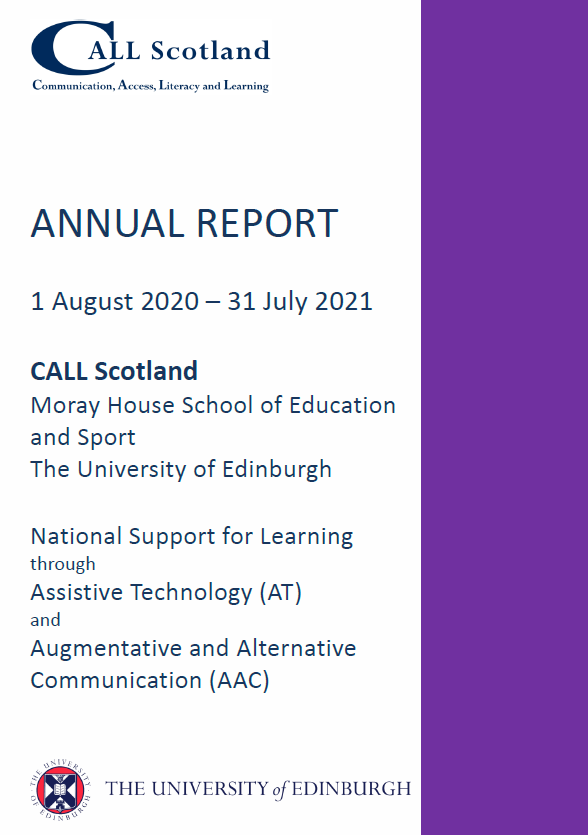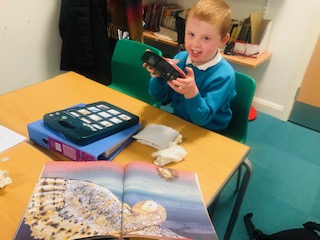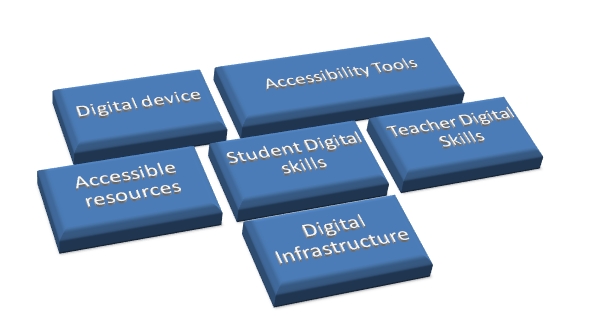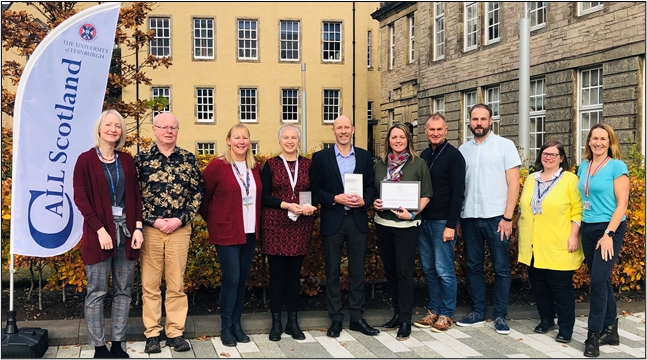Posted by Paul Nisbet on the 14th December, 2021

'May you live in interesting times' is purported to be a Chinese curse (although there seems very little evidence that it is of Chinese origin) but regardless, the 2020-2021 academic session was certainly interesting and challenging. As 2021 draws to a close, we wish you a peaceful break, grateful thanks to everyone who is working to keep us safe, fed, warm and healthy, and we hope 2022 will be kind to you and perhaps a little less interesting.
 A lot has happened over the past year and the CALL Scotland 2020-2021 Annual Report captures some of the events and their impact upon children with disabilities and additional support needs. If you have a chance to read the report I'm sure you'll find it thought-provoking.
A lot has happened over the past year and the CALL Scotland 2020-2021 Annual Report captures some of the events and their impact upon children with disabilities and additional support needs. If you have a chance to read the report I'm sure you'll find it thought-provoking.
Covid-19
The pandemic continues to have an enormous impact upon the life and education of all of us and upon children and young people with disabilities or additional support needs. Learners returned to school for the start of the autumn 2020 term and then schools were closed for the second time in the winter term of 2021. Even when schools opened, some learners and teaching staff were unable to attend due to illness or the need to self-isolate. National 5 examinations were cancelled in October 2020, Highers and Advanced Highers in December, replaced by the Alternative Certification Model. A few weeks ago Omicron appeared just when we thought the situation was improving. It's been tough going for everyone.
Assistive Technology Support
School closures and learning at home led to a rapid expansion of digital education: educators, pupils and families rapidly adopted new ways of teaching and learning. However, support services, including those providing Assistive Technology such as CALL, experienced restrictions on the in-person support that could be provided in school or home. New ways of working based on telephone, video and digital methods of communication were created. While Team or Google meetings certainly reduce travel time and allow more people to participate in meetings, there are some tasks that require a physical presence, and these have been harder to complete. It's been great to have more freedom to get out and work directly with young people and practitioners this term.

A learner using CALL Scotland’s Bookbug symbolised resources as part of an initial AAC assessment.
Professional Learning
The pandemic has of course resulted in an explosion of digital professional learning, courses and webinars, and our experience is that the online model enables larger numbers of practitioners to participate compared to traditional in-person professional learning. In 2020-2021, over 1,400 practitioners attended CALL professional learning events.
ASL Review and Action Plan
Angela Morgan’s review of the implementation of Additional Support for Learning was published in June 2020 and found a “significant disconnect between experience and the stated aspirations of the legislation and policy”. The review made 44 separate recommendations and the ASL Action Plan was subsequently published by the Scottish Government in October 2020. Effective use of Assistive and Communication Technology can contribute to many of these actions and we discuss this in more detail in the annual report.
1:1 devices
The Scottish Government has committed to “provide every school pupil in Scotland with a laptop or tablet” by 2026 and several local authorities have already begun 1:1 device programmes. In a report published by the UK Department for Education in June 2020, Dave Edyburn writes that:
When a person finds the appropriate AT, they are able to complete tasks that they previously could not complete, did slowly, or did poorly. The right AT augments, bypasses, or compensates for a disability (p.5)
However, Edyburn also warns that:
there is a huge gap between the potential of AT and the reality of pupils with special educational needs and disabilities who needlessly struggle on a daily basis to complete routine tasks because they do not have ready access to appropriate AT devices and services. (p. 30).
Modern mainstream technologies now have excellent built-in tools and features to assist and support learners and so provision of a personal digital device offers huge potential for a learner with additional support needs.
It is essential that these devices – whether based on Windows, iOS or ChromeOS – are accessible for learners with additional support needs and unfortunately, years of experience and evidence tells us that this cannot be assumed or taken for granted.
For example, a few weeks ago I visited a primary school to meet a learner with visual and physical support needs. The computers have recently been upgraded to Windows 10 but the Ease of Access settings weren't available and so we could not make essential adjustments for the learner. We don't (yet) know why Ease of Access wasn't accessible on the computers - someone somewhere must think it's not required, or perhaps a security risk - but it's a completely unacceptable situation and in my personal view, illegal under equality and accessibility legislation.
We also hear from teachers, colleagues, parents and learners that the requirement to undertake Data Protection Impact Assessments seems to be restricting the provision of apps or software resources for some learners with disabilities or additional support needs. Complying with data protection legislation is necessary, but so is meeting obligations under equality legislation.

33% of learners in Scotland are identified as having an additional support need. There is no point in providing a learner with a digital device if he or she cannot access it. We propose the development of national Accessibility Standards for devices and digital learning resources to ensure that learners with additional support needs are able to access digital learning. These standards must also encompass digital learning resources, student and practitioner skills and infrastructure.
Looking to 2022
CALL was founded by Phil Odor in 1983; that's a long time ago. I am grateful to officials in Scottish and local government for continued funding; to colleagues in Moray House and the University of Edinburgh for help and assistance; to friends and partners in schools and services in Scotland and further afield; to the learners and families that we endeavour to support; and especially to CALL Scotland colleagues past and present for their commitment and efforts.

May this next year go easier on your soul. I wish you peace in your heart....



Our social media sites - YouTube, Twitter and Facebook